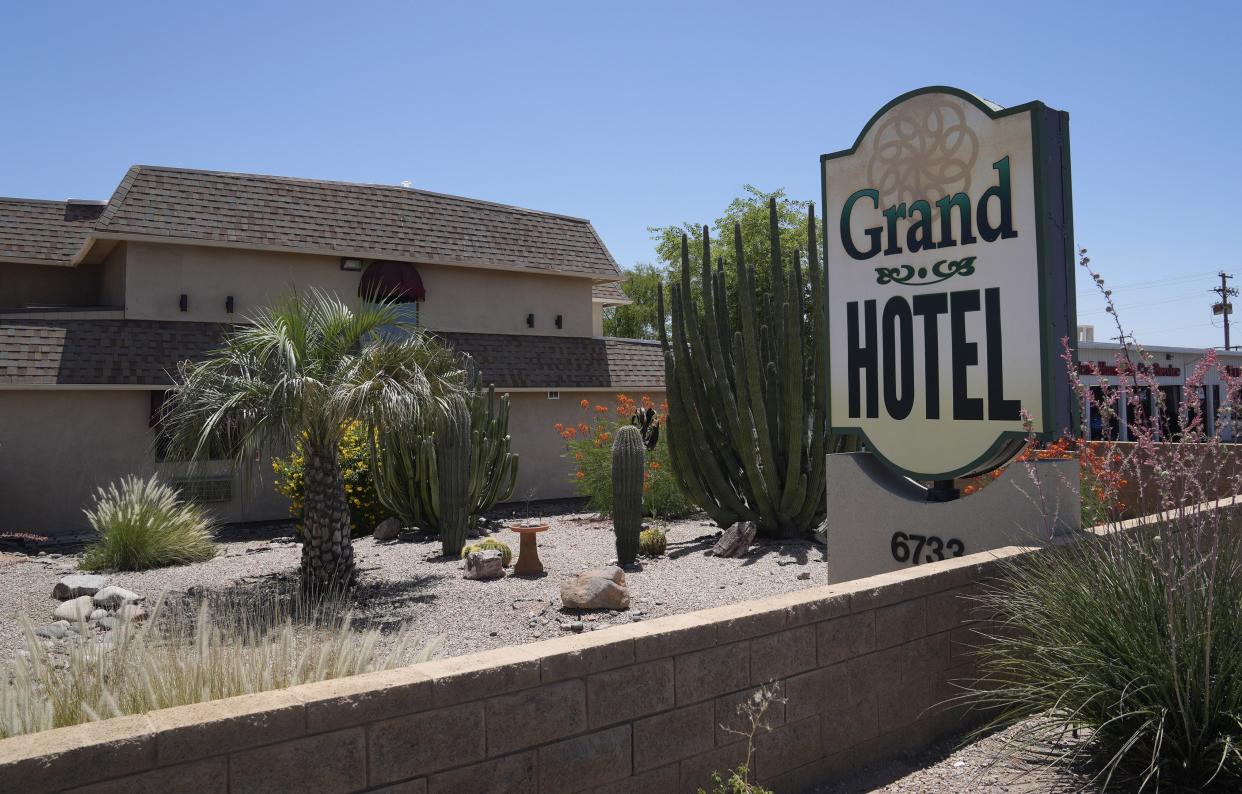Mesa narrowly approves permit to turn Grand Hotel into transitional housing

Mesa City Council, in a split vote before a packed and divided audience, approved a plan to convert a Main Street hotel into the permanent home for the city's transitional housing Off the Streets program.
After almost an hour of public testimony, the council approved the permit and zoning changes passed with a 4-3 vote. It will allow staff to move forward with the purchase of the Grand Hotel along Power Road and Main Street.
Councilmembers Alicia Goforth, Mark Freeman and Scott Somers cast the dissenting votes.
“I’m not in support of a homeless solution that creates a future financial burden for our general fund and liability for our citizens of Mesa,” Freeman said.
Neither Somers nor Goforth explained their no-vote.
Councilmember Julie Spilsbury, who represents the area of the hotel, said she sees the program as an investment in District 2 and the city at large.
“I truly think it’s the right thing to do. That we are helping people that want to get help,” she said. She urged residents to keep the city accountable if it failed to uphold its commitments.
Mesa residents turned out in large numbers to speak for and against the Off the Streets program.
For those against the program, concerns included neighborhood safety, criticism that the social service program was outside the scope of local government and the financial burden it would place on the city.
Residents in favor largely said it was time for Mesa to step up and expand its social services for unhoused people and to continue the program that has helped them get back on their feet.

The council approved a purchase agreement in a 4-3 vote in May to buy the Grand Hotel with $7.4 million of American Rescue Plan Act funds.
The city launched the program in 2020 using $1.75 million a year of COVID-19 relief funds to rent rooms at the Windemere Hotel at Main Street and Recker Road. Mesa plans to tighten the 90-day temporary transitional housing program to serve only the elderly, families and domestic violence victims.
The city estimates spending an annual $3.5 million a year to operate the program out of the Grand Hotel. That’s an estimated $400,000 in savings compared to leasing the building.
The vote comes just days after the final block of Phoenix’s largest homeless encampment known as “The Zone” was cleared. Mesa isn’t alone in this endeavor to buy or build facilities for people experiencing homelessness. In July, the Scottsdale City Council approved the use of $16 million to build a 28-unit affordable apartment complex for seniors and people with disabilities. In 2021, Tempe also purchased a motel for transitional housing.
Residents come out in droves
For nearly an hour Mesa residents spoke on the proposed hotel with comments in support of and against the project.
The program has received staunch opposition throughout the rezoning process over the past several months.
“Do the will of the people. Vote no on this hotel. We are watching and we will remember how you vote,” Pete Anello, a local Republican precinct committee member, told the council.
About seven residents spoke against the project including mayoral candidate Carey Davis, who said the project would increase the homeless population and harm the surrounding neighborhood.
Another dozen residents spoke in favor of the rezoning request, including four people who were helped by Off the Streets.
David Ferguson said the program was a “lifesaver.” Because of the program, Ferguson was able to move into his own place and now owns a dog that he “loves to death.”
“If you follow the rules. If you do what they ask you to do, you can get places,” he said.
Mesa resident and housing advocate Chaelee Chavez said the city's residents had a responsibility to care for their neighbors and not push their “problems off to Phoenix and other communities.”
“If someone is getting evicted in Mesa they shouldn’t have to be shipped off to Phoenix to figure out their housing situation. They should be able to stay in Mesa, get the housing services that they need so they can go back into their communities,” Chavez said.
What comes next?
City staff will close on the purchase agreement by the end of the month, Deputy City Manager Natalie Lewis told the Arizona Republic. She also anticipates it will take two years to make property improvements. The city will build out the improvement in phases to get people into the hotel as soon as possible, Lewis said.
Property improvements to turn the 70-room hotel into a shelter will start in early 2024, according to the city’s project timeline. Those include:
Installing gates on the south and east sides of the parking lot.
Installing new exterior lighting.
Replacing the palm trees with shade trees to create a buffer.
Adding security cameras that are attached to the city’s real-time crime center.
The city is also going to make neighborhood improvements including replacing street lights with LED bulbs, installing nine new street lights and adding cleanup dumpsters.
There will be a around-the-clock police presence. Officers will also be on-site to ensure safety.
A pet yard and a playground will also be added to the property for residential use.
Reporter Maritza Dominguez covers Mesa and Gilbert and can be reached at [email protected] or 480-271-0646. Follow her on X, formerly Twitter: @maritzacdom.
This article originally appeared on Arizona Republic: Mesa approves permit for temporary housing at Grand Hotel
